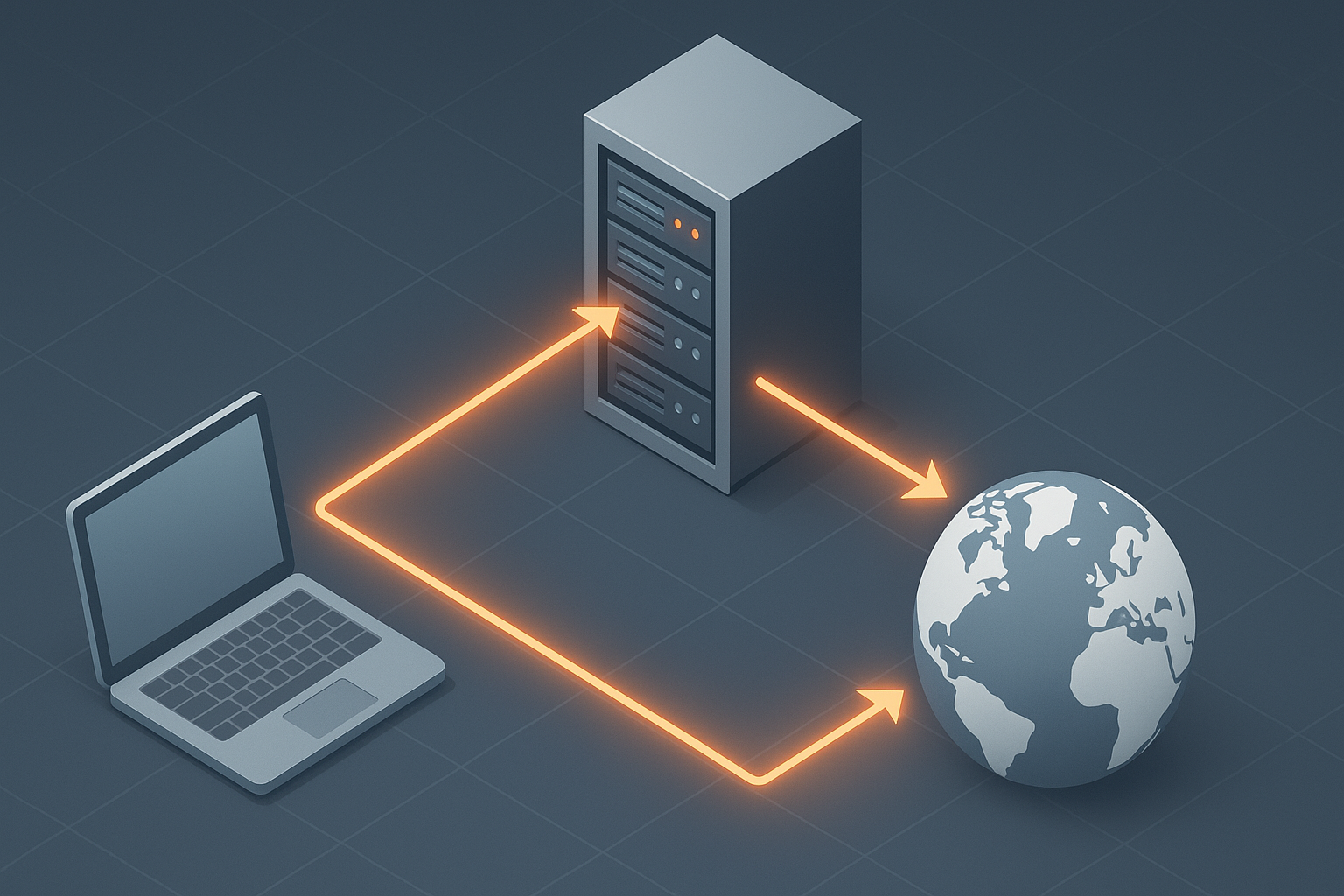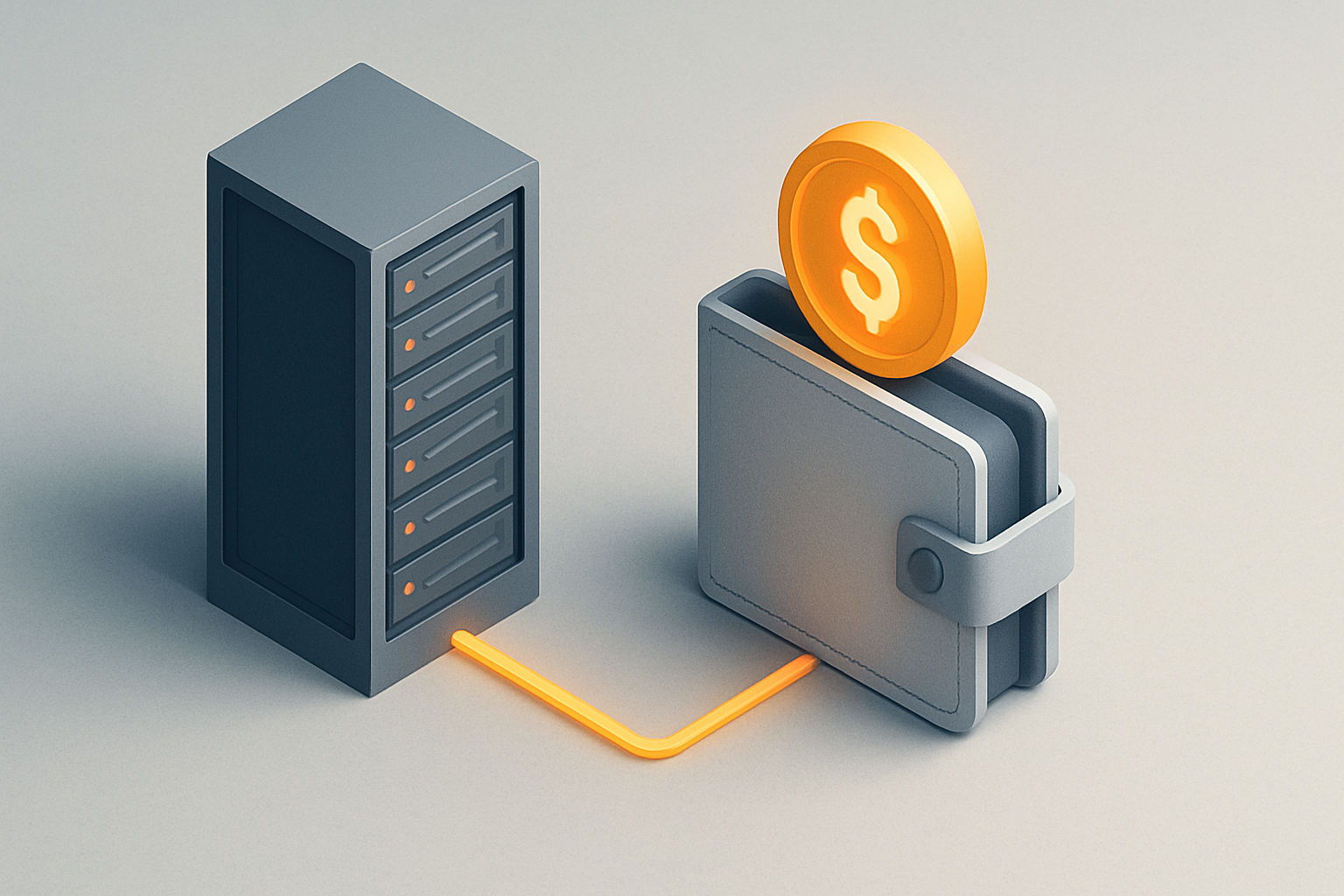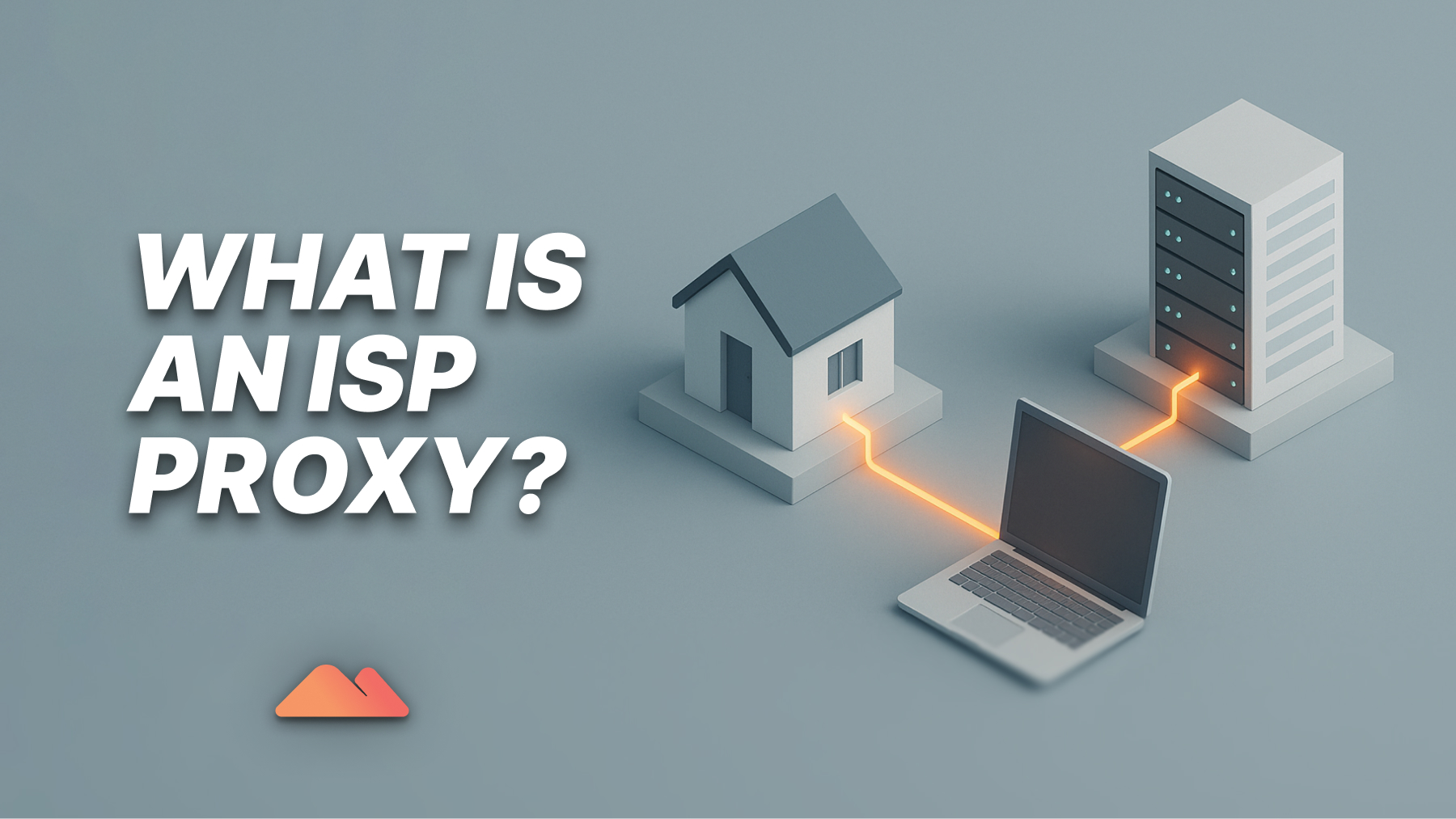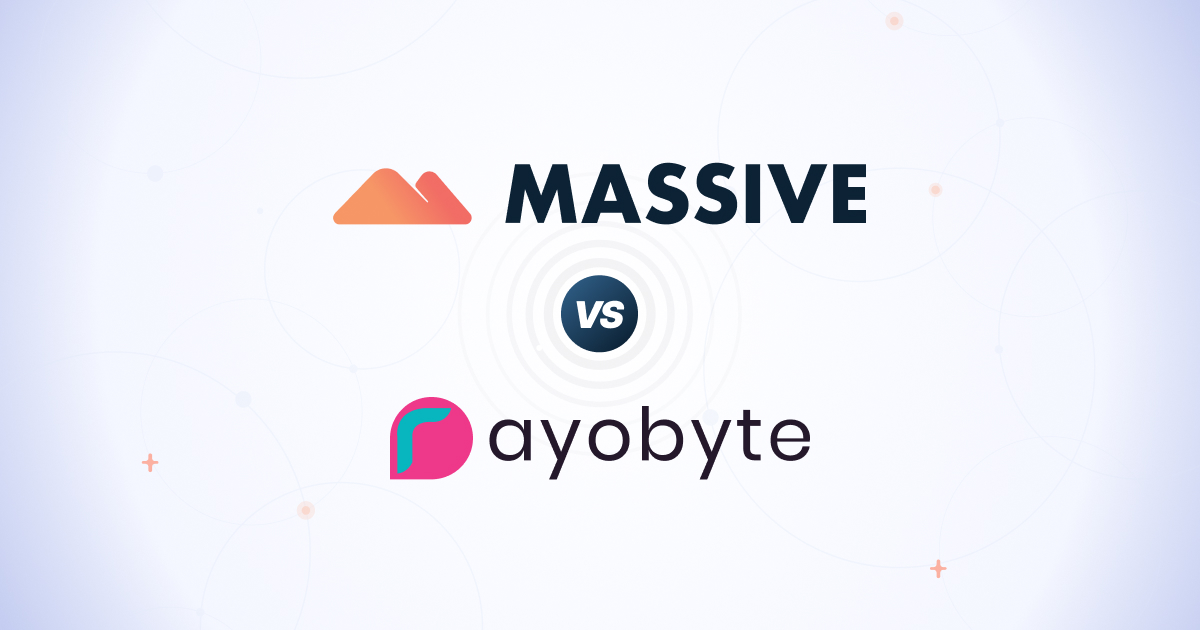What is an ISP Proxy?
An ISP proxy is an IP address registered with a real Internet Service Provider (ISP) but hosted on a data center server. This combination provides the legitimacy of a residential proxy with the performance of datacenter infrastructure.
ISP proxies are also referred to as static residential proxies because they maintain the same IP address throughout your session, unlike rotating residential proxies that frequently change IPs.
Why Should Businesses Use ISP Proxies?
Businesses choose ISP proxies for tasks requiring both legitimacy and performance. They offer 85-95% success rates compared to 70-85% for datacenter proxies, while maintaining consistent speeds of 100Mbps+ versus 1-10Mbps for residential proxies.
How Do ISP Proxies Work?

Understanding ISP proxy architecture is essential for making informed decisions about implementation. ISP proxies operate through a unique infrastructure that combines legitimate ISP registration with data center hosting, creating a hybrid solution that delivers both authenticity and performance.
How Are ISP Proxy IP Addresses Registered?
ISP proxy providers obtain IP addresses through legitimate partnerships with Internet Service Providers. These IPs are registered in regional internet registries (RIRs) under residential classifications, making them appear as genuine home connections to target websites.
Where Are ISP Proxies Hosted?
The registered residential IPs are hosted on enterprise-grade data center servers instead of real user devices. This provides consistent performance with 99.9% uptime guarantees and professional network management.
Why Are ISP Proxies Called "Static"?
Unlike rotating residential proxies, ISP proxies maintain the same IP address throughout your session. This consistency is crucial for tasks like account management and multi-step checkout processes.
What Performance Can I Expect from ISP Proxies?
ISP proxy performance combines the best aspects of residential legitimacy with data center reliability. These performance characteristics make ISP proxies suitable for demanding applications that require both speed and consistent availability.
How Fast Are ISP Proxies?
ISP proxies deliver enterprise-level performance metrics:
- Bandwidth: 100Mbps+ guaranteed
- Latency: 10-50ms average response time
- Uptime: 99.9% availability
- Response time: Under 300ms for most requests
What Geographic Coverage Do ISP Proxies Offer?
Quality ISP proxy providers offer IPs from multiple cities and countries, with proper geographic routing that matches the ISP's actual service areas.
What Are the Main Benefits of ISP Proxies?

ISP proxies offer several distinct advantages that make them superior to alternatives for specific use cases. These benefits stem from their unique combination of residential IP registration and professional hosting infrastructure.
Why Do ISP Proxies Have Better Trust Levels?
ISP proxies carry residential Autonomous System Number (ASN) registration, making them appear as legitimate home internet connections. This residential classification results in significantly lower block rates compared to datacenter proxies.
How Do Static IPs Improve Session Consistency?
Static IP addresses eliminate mid-session changes that can trigger security systems. This consistency is essential for account-based activities and complex automated workflows.
Why Do ISP Proxies Trigger Fewer CAPTCHAs?
Properly managed ISP proxies encounter CAPTCHAs 60-80% less frequently than datacenter proxies, improving automation success rates and reducing operational overhead.
What Success Rates Do ISP Proxies Achieve?
ISP proxies achieve 85-95% success rates for most websites, compared to 70-85% for datacenter proxies and 80-90% for residential proxies.
What Are the Disadvantages of ISP Proxies?
While ISP proxies offer significant advantages, they also come with limitations that may affect their suitability for certain applications. Understanding these drawbacks helps you make informed decisions about when to choose ISP proxies over alternatives.
How Much Do ISP Proxies Cost?
ISP proxies cost $3-15 per IP per month, significantly more than datacenter proxies ($0.50-2 per IP) due to limited availability and higher infrastructure costs.
How Large Are ISP Proxy Pools?
ISP proxy networks typically contain thousands of IPs versus millions for residential networks. This limitation affects large-scale operations requiring constant IP rotation.
What Are Subnet-Level Risks?
If multiple users abuse IPs from the same subnet, entire IP ranges may get blocked. This collective responsibility risk is less common but more impactful than individual IP blocks.
When Should You Use ISP Proxies?

ISP proxies excel in scenarios requiring both residential-level trust and consistent performance. Their static IP nature and high success rates make them ideal for account-based operations, automated business processes, and data collection tasks where reliability is critical. Unlike rotating residential proxies that may disrupt sessions, ISP proxies maintain a consistent identity while delivering enterprise-grade speed and uptime.
Are ISP Proxies Good for Social Media Management?
ISP proxies are ideal for managing multiple social media accounts because they provide consistent IP identity while appearing as legitimate residential users.
Optimal Setup:
- Use one dedicated IP per account
- Match IP geographic location to the account's claimed location
- Maintain consistent usage patterns
- Achieve 95%+ account retention rates
How Do ISP Proxies Help with E-commerce Operations?
ISP proxies provide reliable access for various e-commerce applications without triggering anti-bot systems, making them essential for competitive intelligence and automated purchasing.
E-commerce Store Management
ISP proxies enable seamless management of multiple e-commerce storefronts across different platforms and geographic regions.
Key Benefits:
- Consistent access to seller dashboards
- Reliable inventory synchronization
- Automated order processing
- 90%+ platform access success rate
Price Monitoring and Intelligence
ISP proxies excel at tracking competitor pricing across multiple platforms without detection, providing crucial market intelligence.
Performance Metrics:
- 95%+ success rate for price scraping
- Real-time pricing updates across 50+ sites
- 24/7 monitoring without IP blocks
- Geographic price variation analysis
Market Research and Analysis
ISP proxies enable comprehensive market research by accessing consumer-facing websites as legitimate residential users.
Research Applications:
- Consumer behavior analysis
- Product availability tracking
- Review and rating monitoring
- Competitive positioning assessment
Why Use ISP Proxies for Sneaker Copping?
For high-stakes product releases, ISP proxies offer the speed and legitimacy needed to bypass purchase restrictions.
Key Benefits:
- Sub-200-ms response times for fast checkout
- Residential appearance reduces bot detection
- Consistent IP throughout the purchase process
- Geographic targeting for region-specific releases
Are ISP Proxies Effective for Ad Verification?
ISP proxies enable accurate ad campaign monitoring by appearing as genuine residential users across different geographic locations.
Applications:
- Verify geo-targeted ad display
- Monitor competitor campaigns
- Check brand safety compliance
- Analyze regional pricing variations
How Do ISP Proxies Support SEO Monitoring?
ISP proxies provide reliable access for search engine optimization tasks that require consistent, residential-appearing connections.
Search Engine Ranking Tracking
ISP proxies enable accurate SERP (Search Engine Results Page) monitoring without triggering search engine blocks.
Key Capabilities:
- Track rankings across multiple search engines
- Monitor local search results by geographic location
- Automated keyword position tracking
- Competitor SERP analysis without detection
SEO Audit and Analysis
ISP proxies support comprehensive SEO auditing by accessing websites as genuine users from different locations.
Applications:
- Website crawling for technical SEO analysis
- Page load speed testing from various geolocations
- Content accessibility verification
- Mobile vs desktop experience comparison
When Are ISP Proxies Best for Web Scraping?
For medium-scale data collection (10K-1M requests daily), ISP proxies provide an optimal balance of performance and legitimacy.
Ideal Scenarios:
- Account-based data extraction
- Quality-focused scraping operations
- Long-running monitoring tasks
- Sites with moderate anti-bot protection
How Do ISP Proxies Enable Travel Fare Aggregation?
ISP proxies are essential for travel fare aggregation services that need to access airline and hotel booking sites without triggering anti-bot measures.
Airline Price Monitoring
ISP proxies enable reliable access to airline booking systems for comprehensive fare tracking.
Key Benefits:
- Access multiple airline websites simultaneously
- Track price changes across different booking classes
- Monitor seasonal pricing patterns
- Avoid dynamic pricing discrimination
Hotel Rate Aggregation
ISP proxies facilitate hotel rate comparison across multiple booking platforms and direct hotel websites.
Applications:
- Real-time rate comparison across 100+ booking sites
- Room availability monitoring
- Seasonal pricing analysis
- Geographic rate variation tracking
Travel Booking Automation
ISP proxies enable automated booking processes for travel management companies and corporate travel programs.
Performance Advantages:
- 85%+ booking success rate
- Consistent session management throughout booking process
- Reduced booking failures due to IP blocks
- Support for complex multi-city itineraries
How Much Do ISP Proxies Cost?

ISP proxy pricing varies significantly based on provider quality, geographic coverage, and feature sets. Understanding the cost structure helps you budget appropriately and choose providers that offer the best value for your specific requirements.
What Do Budget ISP Proxy Providers Charge?
Price Range: $3-6 per IP per month
Features: Basic geo-targeting, standard support
Best For: Small businesses, testing purposes
How Much Are Mid-Range ISP Proxy Services?
Price Range: $6-12 per IP per month
Features: Advanced filtering, API access, priority support
Best For: Growing businesses, regular usage
What Do Premium ISP Proxy Providers Cost?
Price Range: $12-25 per IP per month
Features: Custom subnets, dedicated support, SLA guarantees
Best For: Enterprise operations, mission-critical tasks
How Much Are Enterprise ISP Proxy Solutions?
Price Range: $25+ per IP per month
Features: Dedicated infrastructure, custom integrations
Best For: Large-scale operations, specific compliance needs
Pricing Comparison Table
<table class="GeneratedTable">
<thead>
<tr>
<th>Provider Tier</th>
<th>Price Range</th>
<th>Pool Size</th>
<th>Key Features</th>
</tr>
</thead>
<tbody>
<tr>
<td>Budget</td>
<td>$3–6/IP/month</td>
<td>1K–5K IPs</td>
<td>Basic geo-targeting</td>
</tr>
<tr>
<td>Mid-Range</td>
<td>$6–12/IP/month</td>
<td>5K–20K IPs</td>
<td>Advanced features</td>
</tr>
<tr>
<td>Premium</td>
<td>$12–25/IP/month</td>
<td>20K+ IPs</td>
<td>Enterprise support</td>
</tr>
<tr>
<td>Enterprise</td>
<td>$25+/IP/month</td>
<td>Custom</td>
<td>Dedicated infrastructure</td>
</tr>
</tbody>
</table>
How Do You Choose an ISP Proxy Provider?
When choosing an ISP proxy provider, it's crucial to evaluate both technical capabilities and business reliability. At Massive's high-performance ISP proxy services, we've optimized our infrastructure to provide enterprise-grade performance with residential-level legitimacy, making us a trusted choice for businesses requiring consistent, high-performance proxy solutions.
What Technical Requirements Should ISP Providers Meet?
Quality ISP proxy providers must offer:
- Minimum 99% uptime guarantee
- Geographic coverage in target markets
- Responsive 24/7 technical support
- Transparent pricing without hidden fees
- API access for automation
What Should You Evaluate in Provider Infrastructure?
Infrastructure Quality:
- Data center tier certification
- Network redundancy options
- Performance monitoring systems
- Scalability capabilities
How Do You Assess ISP Proxy Pool Quality?
IP Pool Characteristics:
- Subnet diversity across multiple ISPs
- Geographic distribution accuracy
- IP refresh and rotation policies
- Clean reputation maintenance
How Do You Configure ISP Proxies Properly?
Proper ISP proxy configuration is crucial for achieving optimal performance and avoiding detection. The right settings can significantly improve success rates while reducing the likelihood of blocks or authentication issues.
What Are the Best Connection Settings?
Optimal Configuration:
- Connection timeout: 30 seconds
- Request timeout: 60 seconds
- Retry attempts: 3 maximum
- Concurrent connections: 5-10 per IP
- Rate limiting: 1-2 requests per second
How Should You Handle Authentication?
Use rotating authentication credentials to prevent session conflicts and improve security across multiple concurrent connections.
What User-Agent Settings Work Best?
Maintain consistent user-agent strings that match your target geographic location and use case to avoid detection patterns.
How Do You Optimize ISP Proxy Performance?
Optimizing ISP proxy performance involves strategic planning of IP usage, request patterns, and connection management. These optimization techniques can improve success rates by 15-30% while reducing operational costs.
What IP Rotation Patterns Work Best?
Time-Based Rotation: Change IPs every 24-48 hours for account-based tasks
Geographic Rotation: Use location-specific IPs for regional targeting
Load Balancing: Distribute requests across multiple IPs to prevent overuse
How Should You Structure Request Patterns?
Implement realistic delays between requests (2-5 seconds) to mimic human browsing behavior and avoid triggering rate limits.
What Are the Best Practices for Connection Management?
Maintain persistent connections when possible to reduce overhead and improve response times for sequential requests.
What Problems Can Occur with ISP Proxies?
Even high-quality ISP proxies can encounter technical issues that affect performance and reliability. Understanding common problems and their solutions helps minimize downtime and maintain consistent operations.
How Do You Fix Connection Timeout Issues?
Symptoms: Frequent connection failures, slow response times
Solutions: Adjust timeout settings, verify proxy server status, check network connectivity
What Causes Authentication Failures?
Symptoms: 407 Proxy Authentication Required errors
Solutions: Verify credentials, check IP whitelist settings, and rotate authentication tokens
How Do You Handle Geographic Restrictions?
Symptoms: Content blocked based on location
Solutions: Select IPs from appropriate geographic regions, verify ISP service areas
What Should You Do About Rate Limiting?
Symptoms: 429 Too Many Requests errors
Solutions: Implement request delays, distribute across multiple IPs, respect website limits
What Security Measures Should You Take?
Security is paramount when using ISP proxies for business operations, especially when handling sensitive data or accessing critical systems. Implementing proper security measures protects both your operations and maintains compliance with relevant regulations.
How Do You Protect Data Transmission?
Always use HTTPS connections when possible to protect data transmission through proxy servers.
Where Should You Store Proxy Credentials?
Store proxy authentication credentials securely using environment variables or encrypted configuration files.
How Do You Control Proxy Access?
Implement IP whitelisting and access controls to prevent unauthorized proxy usage.
What Compliance Issues Should You Consider?
Ensure proxy usage complies with website terms of service, data protection regulations, and applicable local laws.
How Do You Monitor ISP Proxy Performance?

Continuous monitoring of ISP proxy performance ensures optimal operation and helps identify issues before they impact business operations. Effective monitoring strategies can improve overall system reliability by 25-40%.
What Metrics Should You Track?
Technical Metrics:
- Success rate percentage (target: 85%+)
- Average response time (target: <300ms)
- Uptime percentage (target: 99%+)
- Error rate tracking
What Business Metrics Matter Most?
Business Metrics:
- Cost per successful request
- Task completion rates
- ROI compared to alternatives
- Operational efficiency gains
What Tools Help Monitor Performance?
Use proxy monitoring dashboards to track real-time performance, set up automated alerts for performance degradation, and maintain logs for troubleshooting purposes.
How Do ISP Proxies Compare to Alternatives?
Choosing the right proxy type depends on your specific requirements for performance, cost, and scale. This comparison helps you understand when ISP proxies provide the best value versus datacenter or residential alternatives.
ISP Proxies vs Datacenter Proxies: Which is Better?
ISP proxies cost 3-5x more than datacenter proxies but deliver significantly better success rates and lower detection risk. The choice depends on whether you prioritize cost savings or operational reliability for your specific use case.
ISP Proxy Advantages:
- Higher success rates (85-95% vs 70-85%)
- Lower detection risk
- Better for account-based tasks
Datacenter Proxy Advantages:
- Lower cost ($0.50-2 vs $3-15 per IP)
- Larger available pools
- Higher raw speed potential
ISP Proxies vs Residential Proxies: What's the Difference?
ISP proxies bridge the gap between residential authenticity and datacenter performance, offering 10x faster speeds than residential proxies while maintaining residential-level trust. Residential proxies excel in scale and diversity, while ISP proxies prioritize speed and session consistency.
ISP Proxy Advantages:
- Faster speeds (100Mbps+ vs 1-10Mbps)
- More reliable connections
- Static IP consistency
Residential Proxy Advantages:
- Larger IP pools (millions vs thousands)
- Better for high-volume rotation
- More diverse geographic coverage
What's the Future of ISP Proxy Technology?
The ISP proxy industry is rapidly evolving with new technologies and market demands driving innovation. Understanding these trends helps businesses prepare for future opportunities and technological developments.
What Technology Trends Are Emerging?
The ISP proxy market is evolving with IPv6 adoption, AI-powered proxy selection, and machine learning-based performance optimization.
How Fast Is the Market Growing?
Industry analysts project 15-20% annual growth in the ISP proxy market, driven by increased enterprise adoption and expanding use cases.
What Regulatory Changes Are Coming?
Increasing focus on data privacy and proxy usage regulations will shape how ISP proxy providers operate and maintain compliance.
Conclusion
Les proxys des FAI constituent un puissant compromis entre la légitimité des proxys résidentiels et les performances des proxys des centres de données. Leur combinaison unique d'adresses IP résidentielles hébergées sur une infrastructure de centre de données en fait la solution idéale pour les entreprises qui ont besoin de solutions proxy cohérentes et performantes.
La clé du succès des proxys pour les fournisseurs de services Internet réside dans la compréhension de leurs forces et de leurs limites, dans le choix du fournisseur adapté à vos besoins spécifiques et dans la mise en œuvre de stratégies d'optimisation appropriées. Bien qu'elles puissent être plus coûteuses que les alternatives, l'amélioration des taux de réussite, la constance des performances et la réduction de la complexité opérationnelle justifient souvent l'investissement.
Alors que le secteur des proxys continue d'évoluer, les proxys des fournisseurs de services Internet sont susceptibles de devenir encore plus importants pour les entreprises qui ont besoin de solutions de proxy fiables et performantes. En suivant les meilleures pratiques et stratégies décrites dans ce guide, vous pouvez maximiser la valeur de votre investissement dans le proxy de votre FAI et atteindre vos objectifs commerciaux de manière plus efficace.
Que vous gériez des comptes de réseaux sociaux, que vous réalisiez des études de marché ou que vous automatisiez des opérations de commerce électronique, les proxys des fournisseurs de services Internet offrent la fiabilité et les performances nécessaires pour réussir dans le paysage numérique concurrentiel d'aujourd'hui. Prenez le temps d'évaluer vos besoins spécifiques, de choisir le bon fournisseur et de mettre en œuvre des stratégies d'optimisation appropriées pour tirer le meilleur parti de votre investissement dans le proxy de votre FAI.

Je suis le co-fondateur et PDG de Massive. En plus de travailler sur des startups, je suis musicienne, athlète, mentor, animatrice d'événements et bénévole.
Customer reviews
Question fréquemment posée
Quelle est la différence entre les proxys ISP et les proxys résidentiels ?
+
Les proxys des FAI utilisent des adresses IP résidentielles hébergées sur les serveurs des centres de données, tandis que proxys résidentiels acheminer via de véritables appareils utilisateur. Les proxys FAI offrent de meilleures performances et une meilleure fiabilité, tandis que les proxys résidentiels fournissent des pools IP plus importants et une couverture géographique plus diversifiée. Pour une comparaison détaillée, lisez notre Guide des fournisseurs d'accès à Internet et des proxys résidentiels.
L'utilisation des proxys des FAI est-elle légale ?
+
Oui, les proxys des FAI sont légaux lorsqu'ils sont utilisés à des fins légitimes telles que les études de marché, la surveillance des prix et la vérification des publicités. Cependant, les utilisateurs doivent se conformer aux conditions d'utilisation du site Web et aux lois applicables dans leur juridiction.
De combien de proxys ISP ai-je besoin pour mon projet ?
+
Le nombre dépend de vos besoins spécifiques :
- Gestion des réseaux sociaux : 1 IP par compte
- Web scraping : 1 à 10 adresses IP pour 1 000 requêtes/heure
- Surveillance du commerce électronique : 5 à 20 adresses IP par site Web cible
- Vérification des publicités : 10 à 50 adresses IP par campagne
Quelle est la durée de vie typique d'une adresse IP proxy de fournisseur de services Internet ?
+
Les adresses IP proxy des FAI restent généralement actives pendant 1 à 12 mois, en fonction des habitudes d'utilisation et des politiques des fournisseurs. Les adresses IP bien entretenues peuvent durer plus longtemps avec une rotation appropriée et une utilisation raisonnable.
Puis-je utiliser des proxys ISP pour les services de streaming ?
+
Bien que cela soit techniquement possible, la plupart des services de streaming bloquent activement l'utilisation des proxys, quel que soit leur type. Les proxys ISP peuvent fonctionner temporairement mais ne sont pas recommandés pour les applications de streaming.
Comment puis-je vérifier si le proxy de mon FAI fonctionne correctement ?
+
Vous pouvez tester le proxy de votre FAI en :
- Vérification de votre adresse IP sur whatismyipaddress.com
- Vérifier que la situation géographique correspond aux attentes
- Tester l'accessibilité du site Web
- Surveillance des temps de réponse et des taux de réussite
Quel est le retour sur investissement de l'utilisation de proxys FAI par rapport à des alternatives gratuites ?
+
Les proxys des fournisseurs de services Internet offrent généralement des taux de réussite 3 à 5 fois supérieurs et des performances 2 à 3 fois plus rapides que les proxys gratuits, ce qui se traduit par une productivité accrue et des coûts opérationnels inférieurs malgré un investissement initial plus élevé.
Comment puis-je adapter l'utilisation du proxy de mon FAI à mesure que mon activité se développe ?
+
Les stratégies de mise à l'échelle incluent :
- Négociation de remises sur volume avec les fournisseurs
- Mise en œuvre de systèmes de gestion de proxy automatisés
- Utilisation de l'équilibrage de charge entre plusieurs fournisseurs
- Optimisation des modèles d'utilisation pour réduire les coûts







